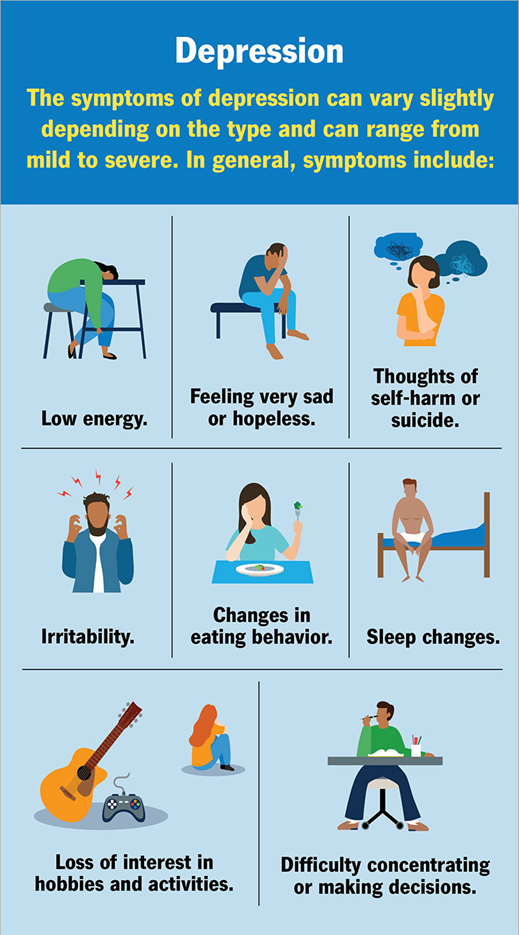A nurse is leading a grief support group for bereaved clients. Which of the following client statements should the nurse report to the provider as an indication of clinical depression?
"I feel like I'm angry at the whole world right now."
"I don't feel anything but numbness anymore."
"I don't know how I could cope if I didn't have my family's support."
"It'll be a long time before I'm happy again."
The Correct Answer is B
Choice A reason:
Feeling angry at the world is a common reaction to grief and loss. Anger is one of the stages of grief and does not necessarily indicate clinical depression. While it is important to monitor the client's emotional state, anger alone is not a definitive sign of depression.
Choice B reason:
Expressing a sense of numbness and an inability to feel emotions is a significant indicator of clinical depression. This symptom, known as anhedonia, reflects a loss of interest or pleasure in most activities and is a core feature of major depressive disorder. It is crucial to report this to the provider for further evaluation and intervention.
Choice C reason:
Acknowledging the importance of family support is a positive coping mechanism. This statement indicates that the client recognizes their support system, which is beneficial for managing grief. It does not suggest clinical depression.
Choice D reason:
Feeling that it will take a long time to be happy again is a normal part of the grieving process. Grief can be prolonged, and it is natural for clients to feel that their happiness is distant. This statement alone does not indicate clinical depression

Nursing Test Bank
Naxlex Comprehensive Predictor Exams
Related Questions
Correct Answer is C
Explanation
Choice A reason:
Telling a client to focus on themselves for a change may come across as dismissive and does not address the underlying feelings of hopelessness. It is important for the nurse to acknowledge the client's feelings and provide support rather than suggesting a shift in focus without understanding the root cause of their distress.
Choice B reason:
Asking the client why they feel like things will never work out can be a useful way to explore their thoughts and feelings. However, it may not be the most immediate concern if the client is experiencing severe hopelessness or suicidal ideation. The nurse should prioritize assessing the client's safety and risk of self-harm.
Choice C reason:
Asking if the client has been thinking about harming themselves is crucial in assessing their safety. Suicidal ideation is a serious concern, and it is important for the nurse to directly address this issue to determine if the client is at risk of self-harm. This response shows that the nurse is taking the client's feelings seriously and is concerned about their well-being.
Choice D reason:
Suggesting an antidepressant might make the client feel better can be helpful in the long term, but it does not address the immediate emotional distress the client is experiencing. Medication can be part of a treatment plan, but the nurse should first ensure the client's immediate safety and provide emotional support.
Correct Answer is A
Explanation
Choice A reason:
The client's best friend moving away can significantly impact their emotional well-being and stress levels. Emotional support is crucial during recovery from major surgery like coronary artery bypass. The absence of a close friend can lead to feelings of loneliness and increased stress, which can negatively affect the healing process. Stress can elevate cortisol levels, which may impair immune function and slow down recovery. Therefore, the nurse should recognize this factor as a potential interference with the client's recovery.
Choice B reason:
Walking the dog daily is generally beneficial for recovery. Physical activity, such as walking, can improve cardiovascular health, enhance mood, and reduce stress. It helps in maintaining mobility and preventing complications like blood clots. Therefore, this activity is unlikely to interfere with the client's recovery and may actually support it.
Choice C reason:
Stopping coffee consumption can have mixed effects. While reducing caffeine intake might be beneficial for some individuals, abrupt cessation can lead to withdrawal symptoms such as headaches, irritability, and fatigue. These symptoms can add to the client's stress and discomfort during recovery. However, this is generally a temporary issue and not as significant as the emotional impact of losing a close friend.
Choice D reason:
Exercising in the morning is typically a positive habit for recovery. Regular exercise can improve circulation, reduce stress, and enhance overall physical health. It can also help in maintaining a routine and providing a sense of normalcy. Therefore, morning exercise is unlikely to interfere with recovery and is usually encouraged.
Whether you are a student looking to ace your exams or a practicing nurse seeking to enhance your expertise , our nursing education contents will empower you with the confidence and competence to make a difference in the lives of patients and become a respected leader in the healthcare field.
Visit Naxlex, invest in your future and unlock endless possibilities with our unparalleled nursing education contents today
Report Wrong Answer on the Current Question
Do you disagree with the answer? If yes, what is your expected answer? Explain.
Kindly be descriptive with the issue you are facing.
